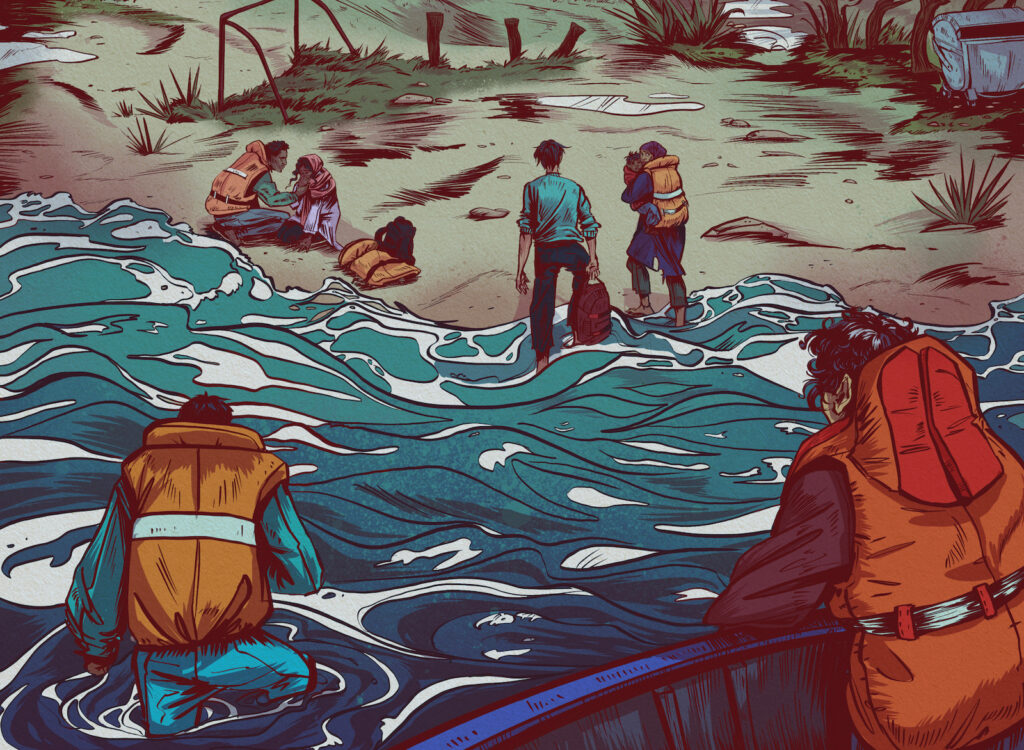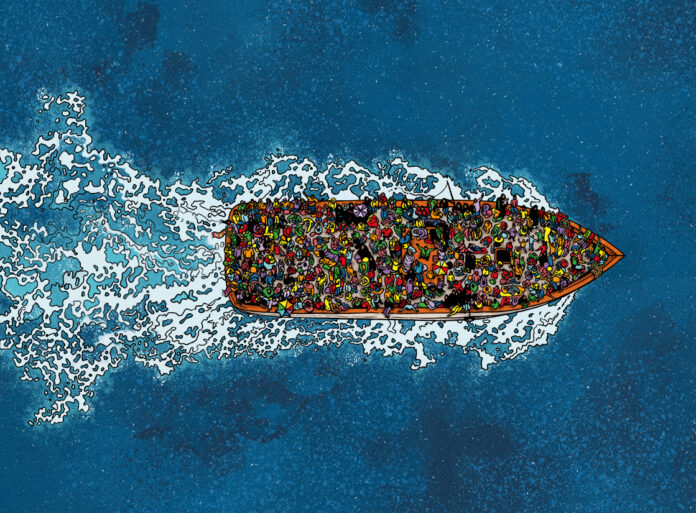Jędrzej Napiecek was not in a good place. 25 years old, fresh out of script writing studies and feeling detached from society. To be honest, he just felt so… useless. He desperately needed change, something to reinvent himself. In 2014 he started hearing stories of refugees drowning in the Mediterranean. It was horrendous and he felt the drive to get involved. This would make an interesting topic for a game, he thought.
Napiecek had tried to break into the games industry for a while now, but no game company wanted to hire him. Not without the relevant experience at least. “I had mostly written autobiographical texts to boost my ego. And I had the impression that no one was interested in it but myself”, he says. So, making a game about the refugee crisis could potentially establish him as a serious game writer. “I thought that the closed game world – in the form of people on a smuggling boat – would be easy to implement in the form of a game. Of course, I was wrong.”
In the 8 years that followed Napiecek found out the hard way that making games is not easy. Plus the motivations of people to leave their homes and the hardship refugees have to endure in hope of a better life was impossible to fully grasp from his position of privilege. Initially the protagonist of We. The Refugees: Ticket to Europe was a refugee who was finding his way to Europe. “I thought I was doing some kind of social mission by dealing with the issue of refugees. In fact, I just sat in my safe and warm apartment in Central Europe and read books about this topic with the feeling that I was doing ‘something important’. But to be honest I was just calming my conscience.”
Moria refugee camp
Everything changed when the development team went to the Greek Island of Lesbos to visit the Moria refugee camp in 2018. Their mission was to do research by interviewing actual refugees. When he arrived on the island Napiecek felt out of his depth. He had read over thirty books on refugees, Africa and the Middle East, but all his theoretical knowledge didn’t mean anything between the thousands of people holed up in tents. “I felt like an imposter most of the time I was working on the game. Especially after visiting the Moria refugee camp.”

“I understood then that I am unable to understand their experiences and tragedies on a deep, emotional level. And that I have no right to speak on their behalf”, Napiecek says. “No matter how many books I read, how many documentaries I see about refugees, and how many days I spend talking to them, I wouldn’t be able to emotionally understand what it means to flee from my home country or lose my family in a bombing. All I could do was try to understand them. Hear their story.”
Dramatic axis
Napiecek felt defeated. He came close to abandoning the project when he had to throw out the 600 pages of the script. He no longer believed it told the truth about refugees. He actually went through a crisis himself and for a few months he thought he had no right to make a game about this topic. Ultimately, however, this emotionally difficult period served as a dramatic axis in the final version of the game. Because in the end ‘We. The Refugees’ is about the moral dilemmas of a man who deals with the subject of refugees.

“That’s why we changed the main premise in the final version of the game. Now, the protagonist is a journalist who does research on refugees. It was kind of my admission of defeat, that I would not be able to make a credible game from a refugee point of view. But I had a lot to say about what it’s like to deal with it from a journalist’s perspective. That’s why the final version of the game – paradoxically – is a bit autobiographical, although I took up the topic to escape autobiography. But ultimately I felt it was the only way not to lie about the refugees and not claim to speak on their behalf.”
Real tragedies
After his visit to Moria Napiecek had to completely rewrite the story. He calls it his biggest challenge. “The process of writing the 300,000-word script took me 20 months. Here I went through creative crises many times. But at such moments I always remembered the refugees I met in Moria and it gave me strength and allowed me to gain distance from myself. They experienced real tragedies, not me.”

In addition to his creative worries, Napiecek also had to deal with financial concerns. When a deal with an investor fell through after only four months, he found his studio in debt. In order to pay off his employees the studio started working as subcontractors on games like simulators. Finally the game found financing thanks to a subsidy from the European Union. And, with the game almost finished, publisher Polyslash picked up We. The Refugees: Ticket to Europe. The game is now slated for an April release.
Ambitious project
“I feel surreal. This process took so long that now I have no idea what to expect”, says Napiecek. “This is my first game – and my debut as a Game Writer – and I have no idea what the player feedback will be. However, I have already started working on another title – also Text-Based RPG, but this time with greater commercial potential. I honestly admit that 8 years of fighting to create an ambitious project is a very long time. Although I am satisfied that the project was completed, I am also tired. I would like the next game to be made in less spartan conditions and to have a stable budget for the next project.”
Play the demo and buy the full game We. The Refugees: Ticket to Europe on Steam.

